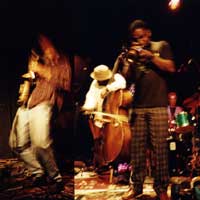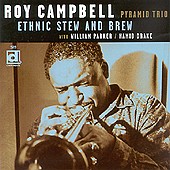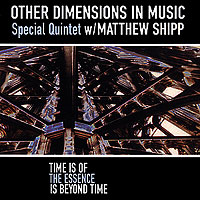
A
FIRESIDE CHAT WITH ROY CAMPBELL
Other Dimensions in Music is heavy improvised music. It has next to no
crossover appeal and thank God for that. Crossover, what is that anyway?
Selling out is a couple of words that come to mind. And selling out is
not in Roy Campbell's vocabulary and considering he is the vibe behind
ODM, they, along with the David S. Ware Quartet are now the two groups
that I am lobbying for to come to Cali. And considering my background
is in politics, I can lobby with the best of them. I am pleased to present,
Roy Campbell, unedited and in his own words.
FRED JUNG: Let's start from the beginning.
ROY
CAMPBELL: First of all, my father was a trumpet player and he played saxophone
when I was a child. He used to practice trumpet. My family had a lot of
music around the house. They had rhythm and blues music and jazz. When
I was a kid, I used have a 78 record player and I used to play Walt Disney
records, soundtracks, TV soundtracks when I was young. When I was six,
I started taking piano lessons for a couple of years. In elementary school,
I played flute and recorder. Then in junior high school, I started playing
violin. I was into a lot of different music, but I started with classical
music first. When I got up to about twelve, I really started to really
seriously listen to jazz music and my father had records around the house,
Charlie Parker with Strings, Clifford Brown with Strings, Jimmy Smith,
and also some John Coltrane records he had. I like Blue Train and Jackie
McLean. He had a record by Jackie McLean called New Soil. I basically
grew up listening to jazz. Then when I was about twelve or thirteen, they
used to have concerts with artists like Miles Davis, Thelonious Monk,
Cannonball Adderley, and Aretha Franklin. I used to an usher at the shows
and so I heard a lot of music. Also, there were clubs in my neighborhood
too. I met Lee Morgan when I was fifteen years old. I met Woody Shaw when
I was sixteen. He played a local club here. I also saw Stanley Turrentine,
Lou Donaldson, Art Blakey, a lot of people. I also saw Louis Armstrong
and Duke Ellington at Carnegie Hall. I have seen Coleman Hawkins. So I
was very into the jazz music. I really started buying a lot of jazz albums
when I was thirteen, fourteen. I bought a lot of Blue Note records and
Prestige records of great jazz artists that I liked. When I bought one
record, I found out about another artist and then I would buy their record.
When I was fifteen and sixteen, I had a good knowledge of people that
had played jazz through my record collection. The music motivated me so
much that I wanted to play an instrument, so I was thinking about playing
tenor saxophone. I didn't get a saxophone so I started picking up my father's
old trumpet when I was about seventeen. He told me to get a book and I
started teaching myself. Then when I was like eighteen, I started becoming
very serious about music and so I went to a workshop and Lee Morgan and
Kenny Dorham taught there and I had lessons with them in group situations.
I also went to a jazz interaction workshop where Howard McGhee and Thad
Jones were there. I went to Manhattan Community College in New York and
they had a jazz program. I studied with Yusef Lateef. I studied composing
and arranging and theory with him. I was going to these different workshops,
studying in school, and studying privately. I got a well-rounded background.
FJ: Is there one record that you wore out the grooves of?
ROY
CAMPBELL: Yes, The Sidewinder by Lee Morgan. He had an album also called
The Gigolo. That was out at the time I met him. That was a record that
I wore out too.
FJ:
All those releases are pretty much the jazz standard. How did you go from
there to the more turbulent material you are playing now?
ROY
CAMPBELL: Well, when I was fifteen, I started listening to the avant-garde
music because I had met Sunny Murray. I saw Cecil Taylor perform solo
and Sonny Rollins do a solo concert at the Whitney Museum too. My father
used to play with Ornette Coleman in the early Fifties when he was out
in California. They used to play rhythm and blues gigs and bebop gigs
along Central Avenue. There used to be a lot of clubs along Central Avenue
in the early Fifties. I also was into Albert Ayler too. I got interested
in that music. There used to be a record shop on 42nd Street and they
used to have ESP albums there for 99 cents. I didn't even know who some
of the artists were, but I would end up buying albums by Charles Tyler,
Frank Wright, and Sonny Simmons. I found it interesting because I have
perfect pitch and if you have perfect pitch, you can hear every tone that
is possible with a tempered scale and non-tempered.
FJ:
That makes playing the trumpet easier.
ROY
CAMPBELL: Yeah, it does, Fred. I didn't realize that I had perfect pitch
until I studied with Yusef Lateef. He was showing the class intervals
one day and I didn't know about intervals. He ran up and down the piano
and every note he played, I told him what it was. I was born with perfect
pitch and I didn't discover that until I was nineteen years old. I thought
all musicians that played music had ears like mine. When I was in junior
high school, I didn't want to play violin, but the music teacher insisted
I play the violin because I had a good ear. I wanted to play the bass
or saxophone or trumpet, even in junior high school. They wouldn't give
us a choice of instruments.
FJ:
What is it about advanced avant that inspired you?
ROY
CAMPBELL: It was interesting because it wasn't predictable for one thing.
You would hear like half tones and quarter tones and atonal stuff that
would be different from conventional jazz. With what I knew about conventional
music and jazz, I really could see the relationship, but when I heard
some of Albert Ayler's music, it was like, to me, his music was like a
three hundred and sixty degree circle. His music was New Orleans march
things and then when he would solo, they would go outside that basic stuff.
It was different. No matter what point you hit on a circle, it is still
a circle and that is how I regard the music. I am not just into jazz.
I am into reggae, country, classical, and world music.
FJ:
You met all these legendary players, what is the trait that all of them
had?
ROY
CAMPBELL: You know what it is Fred? They had their own voice, their own
sound, and their individual way so you know that that is them. It was
like their fingerprints or signing their signature.
FJ:
Do you have your own musical fingerprint?
ROY
CAMPBELL: Yeah, I do. When I was playing for three years, a lot of people
that heard me then could tell. They knew I was playing and there would
be other trumpet players there, but they knew it was me because I had
something that was me. I think over the years, I have just been refining
that and enhancing that and developing that more.
FJ:
Let's talk about the two albums you did for the Chicago Delmark label,
New Kingdom and La Tierra del Fuego.
ROY
CAMPBELL: I think New Kingdom, when I first did that, it presented a lot
of the different styles of jazz that I am capable of playing. I called
it Roy Campbell 101. So it is like an introduction to some of the things
I do. There is a variety of different styles of music on there. It also
was divided between a trio and a sextet. I was working with Bryan Carrott,
playing vibes on that CD. I was in Billy Bang's band and we started doing
some gigs with Thurman Barker. Thurman Barker was in the band. I started
playing with Thurman and I heard how the vibes combined with the trumpet
and that is when I knew that this was the other sound that I was looking
for. I had played with piano players and guitar players too. I didn't
have the opportunity to play with vibe players that much. La Tierra del
Fuego was more of a compositional type of thing, the arranging capacity
and the compositional capacity and arranging the horns because there are
a few tracks on there that had a nine piece band.
FJ:
William Parker contributes to New Kingdom. He worked with you in your
Pyramid Trio. Not too many in the general public are familiar with him
outside of certain circles, but he is a phenom bass player.
ROY
CAMPBELL: He sure is, Fred. Me and William are like brothers. We have
been playing together since 1978. The first time we met each other and
played with one another, it was like kindred spirits. There was very good
chemistry there. We played with Jemeel (Moondoc for ten years. And we
played with all kinds of bands in the early Eighties that a lot of people
don't know about that were underground and an extension of the loft scene.
We played a lot together. Me and William are like musical brothers and
everybody over the years knows when we are together, something special
is going to happen. There is chemistry, a likeness in spirit and mind
and we just connect, Fred.
FJ:
Let's talk about Other Dimensions in Music. You have a record coming out
in March on AUM Fidelity that is cryptically titled Time is of the Essence
is Beyond Time with Matthew Shipp, a follow-up to the kick ass, Now, you
put out a year ago on the same label. ODIM really caters to what you do
best.
ROY
CAMPBELL: I created the band with just that concept in mind. I have played
in big bands. I played with Carlos Garnett. He had a big band in the Seventies.
I went through all the traditional steps and that was fine, but after
a while, I wanted to do something else. I met Daniel (Carter) in 1974
and when we used to rehearse with Jemeel in '79 ad '80, a lot of times
before we would do the actual compositions, we would just improvise. Some
of what we would improvise, I would listen to on tapes later. I created
tunes from some of the improvisations. I had a group in 1974 and Daniel
Carter came to some of the rehearsals. I liked the way he played, but
he said he didn't want to play written music and he was off into another
concept. So I said, "OK, you are welcome to play with me anytime." I met
him again at an after hours jam session in 1981 and when Jemeel went away
to Germany, I grabbed Daniel and formed Other Dimensions. Other Dimensions
has been around since '82. We all went into different directions for a
period of time and we started to get back together and we recorded a CD
for Silkheart.
Fred
Jung is the Editor-In-Chief and Interview mogul. Comments? Email
Fred.


